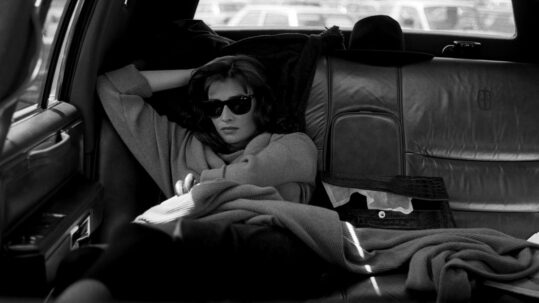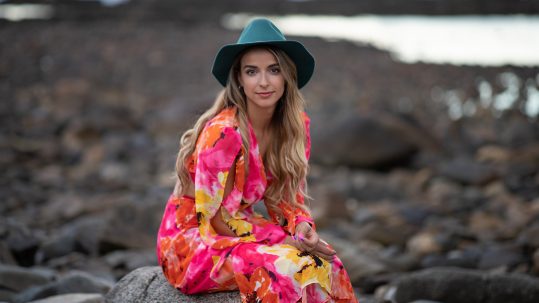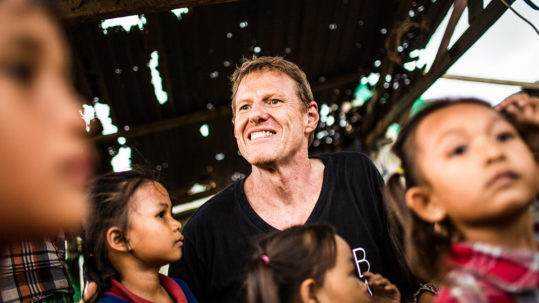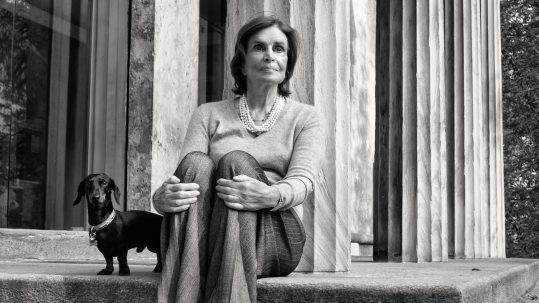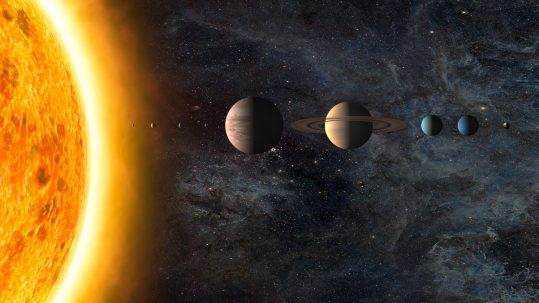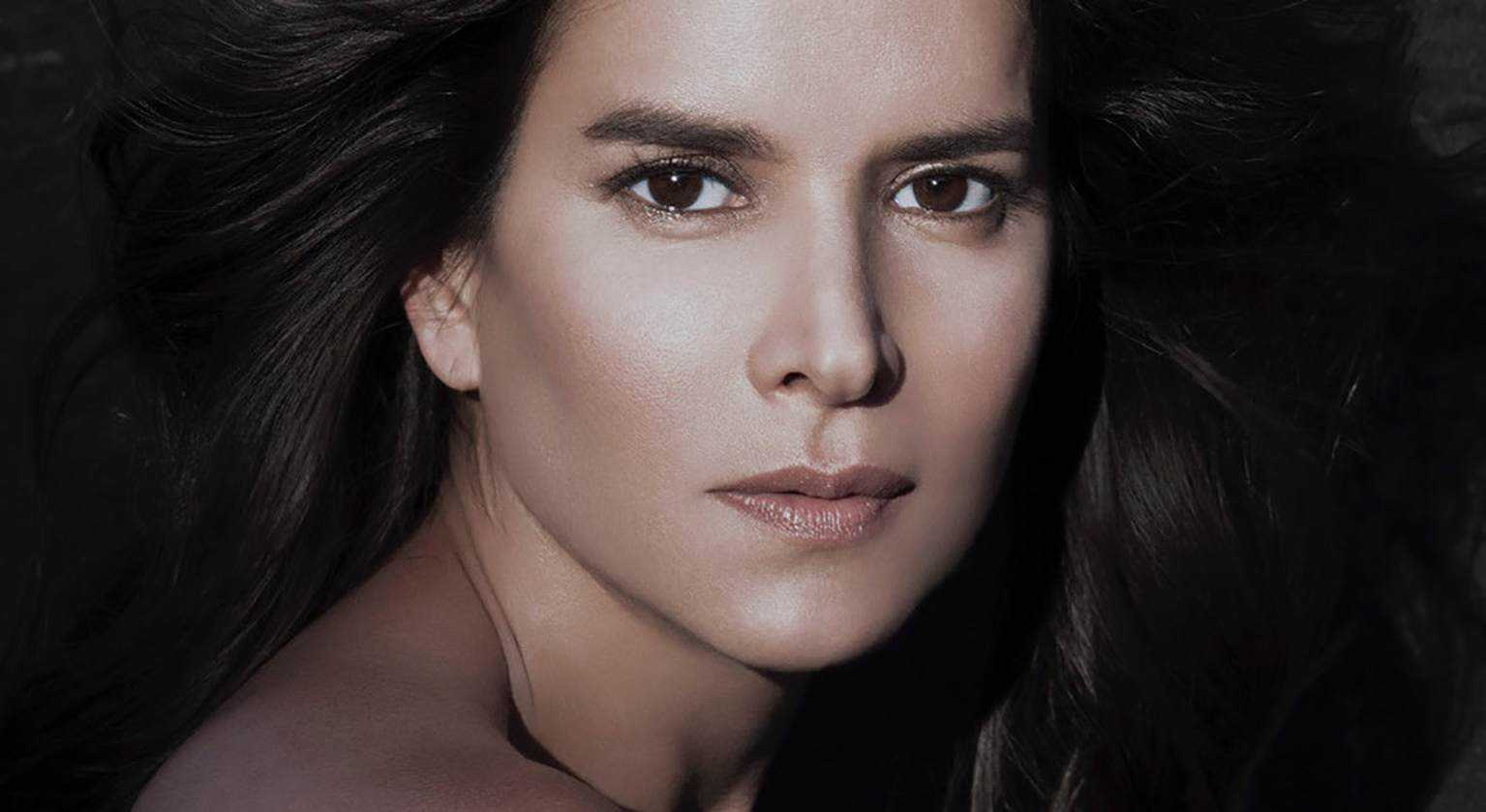
04 Oct Patricia Velásquez
Photo: Marta Elena Vassilakis | Makeup & Hair by Dorite G. Nizzani using Arbonne Cosmetics.
PATRICIA VELÁSQUEZ
Hailed as one of the most beautiful women in the world, Patricia Velásquez paved the way for numerous Latina models after her. A proud indigenous Wayúu, Mrs. Velásquez has helped dozens of thousands of men and women, and schooled more than 5000 children through her foundation ‘Wayúu Tayá’. A discussion about life, acting, hope and what it means to be human.
By Victoria Adelaide | OCT 23. 2017
Victoria Adelaide: You said that you come from a modest background. How did that impact your desire to succeed in life and to be the woman that you are now?
Patricia Velásquez: My whole life I was under the impression that in order to be strong, independent and successful, one has to struggle like I did when I was little and become a survivor. I realized that for me, it was about having to survive. The first few years, when we lived in France, then moved to Mexico, were fine. We had food, education, some abundance, we were not rich but we had what we needed in order to grow healthy, being able to go to school or to take dance classes. When we went back to Venezuela, I was 9 years old, that’s when things got really rough; we had to strive so much for food, we didn’t have basic things like water, and I saw my parents struggle so much. It made us, 6 brothers and sisters become survivors. But my parents gave us a good education, good values, so we understood that it was through education that we would be able to get to a better place. We didn’t think like we’re doing now in our society, teaching, showing new generations that there are shortcuts and that you can get there through a shortcut. Today you can become famous with a reality show, by doing nothing, win the lottery and make money. So, the idea of what success is in terms of money, in terms of fame, it’s to some extent what’s teaching this new generation that it’s through shortcuts that they can make it. And this is something that I struggle with, but definitely for me, it was because of my own experience. Now do I think that it’s the only way somebody can be successful and have good values? No. I’ve seen many people in my life who have young kids, who are extremely successful, who are dedicated, and they didn’t necessary have to go through as much trouble as I did. They just really have grown up in families where they have good values, and it’s make me very hopeful because it makes me think that I can do that in my own family. We don’t necessary have to go through that struggle; you can get help from people around you and I can be in a position to help others, especially younger people.
VA: You are doing very well as an actress. Coming from a background in fashion was it easier for you to shift into acting or not?
PV: There is the belief that models are not good actress and that is completely the opposite. The few models that have maybe tried to go into the industry and act with zero preparation, most of the time have really big names and they have made the rest of us look really bad. But the truth is that, some of the best actresses out there, Michelle Pfeiffer for example, they have been models. The reason why this happens is because when you work as a model – especially the type of modeling that super models have done – you have to work from the knowledge of your emotions. When you work with photographers like Paolo Roversi, people like that, you have to be very connected with your emotions. You’re not utilizing the voice but you are using the energy. I come from a background of dance, so when you grow up dancing, you move the energy in the body in a very different way. When you put a hand like this, it’s not doing anything with the energy but if it goes like this, there’s a radiant energy that goes out, and when you are shooting a photograph, if you’re doing this instead of doing that, obviously photographers are gonna love it because the energy flows, goes, and then they get excited about it. That is what I believe personally made me successful as a model. When you work as a model in this type of round of modeling you become one with the camera. A camera is not something that intimidates you, a camera is something that allows you to practice. ‘Substitution’ for example, if you have to be a sexy person when you’re shooting a photograph, then you are using substitution; you are probably imagining that the photographer is somebody, that is rule number one as an actor. If you have to play a girl who is outside in a farm, you put yourself in that situation. It is incredible training for then becoming an actor because you don’t care about the camera anymore. The camera is an element there. Many people are like ‘my right side, my left side’, models don’t think that way, we are not trained to think that way because we’re trying to use the energy of what we want to transmit; that is what goes on the photographs. You don’t really care if they photograph you from the right side or the left side because they all look good, you are in the energy, you are not into ‘this is what looks better’. That is why we have a big advantage. When we decide to become actors, we have had years of training that most people wouldn’t have. Now we have to do the work and get the proper training, to manage emotions and to utilize the voice. I struggled with my voice for some movies. I had to have major voice training for some of my roles, because we are not used to the breathing techniques and to utilize the voice when we should be using it. We have to think about why we are doing what we’re doing. Because many times we have been the center of attention; like I was talking to my daughter a couple of days ago, about the Concorde, what the Concorde was and you look back and say ‘I used to take that plane, 4 times a week’, as if it was nothing. And then what happens when you are so much at the center of attention and then the career ends? Modeling is only for a short time, that is something we are not prepared for and no one tells you that. Now a little bit more unless you have some great friends like I did, like Katie Ford, who would tell you ‘Save your money because this is not going to last, this is for a few years only’. Most of the time, most models look around and there is no more money coming in, they are no longer the center of attention. Most girls make the wrong decisions, by saying ‘I have to do something that will keep me in the lime light, I can become an actress without any sort of training or a politician’. The modeling world is not the way it used to be years ago. I was very fortunate, because my success didn’t come right away; I had to work every step of the way. I had a big advantage, my career has lasted for a long time and everything came gradually. But you do feel a little bit weird the rest of your life, I have to tell you. Any model can tell you about this. Because you experience a career very quickly, something that other people will not experience. You’re eighteen years old, you’re traveling the world on your own, you’re managing your own account, you have to make decisions, you have to be extremely professional. It’s an incredible gift but it can also be very dangerous if you don’t manage it well. And then when the time ends, you’re left like ‘What do you mean?’; it’s like if you try sugar and then sugar gets taken away from you. It is a wonderful experience but you have to make the right decisions.
VA: Did you have to work on yourself to achieve this authenticity in your play to be in tune with your voice?
PV: Most of my acting has been done in English. I had to do a movie in Spanish and that’s when I noticed that I needed to work on my voice because my pitch was too high. I didn’t like it and people around me didn’t like it. That’s when I started working on my voice and my tone of voice has changed as a result, and I started working on a lower register. The first movie I shot after I had really worked a lot on my voice, is a movie you can see on Netflix it’s called ‘Liz in September’ and there, you can really hear the changes in my voice. After that all the work that I’ve done, I did it in a much lower register.
VA: Did you have to impose yourself?
PV: At the beginning, I started with a French film called ‘Le Jaguar’, the biggest French movie ever made in history with Jean Reno, Patrick Bruel, and Francis Veber, the writer and director of ‘La Cage aux Folles’. That was a little bit of a resistance, but when I came back, I was living in New York, I had fallen in love with the experience. Imagine working with Jean Reno in the jungle for two months, who wouldn’t fall in love with the business, working with such an incredible actor. I started studying. I told my agent that this was what I wanted to do. So far, the work I did before was because I wanted to help my family, and even though I loved modeling, it wasn’t until I did this film that I finally experienced what is it like to do what you love. That was the first time and I thought I needed to do this but I needed to do it right. Because I grew up in dance and theater, I have a lot of respect for the industry, so I told my agent, ‘I need to study, I know this is going to be a waste of time for you guys, but if you want to stick with me, give me some time, let me grow, get ready, study and prepare. And when I’m ready I will come back and then we go for it’. And they said yes! I felt very blessed. I remembered the agency was called ‘J. Michael Bloom’, and it was him that I talked to, and they said ’yes, go, do it, we will wait. Can we send you for auditions in the meantime?’, and I said ‘No, you cannot. I want people to start talking about me because of my work, not because I’m a model turned actress. I want them to start talking because that’s the work that they like’. And then for two years, I went to school, learning with amazing teachers, and then once I was ready, I went back and I started to work. This is how I did it. Fortunately enough, I had another business, I was able to support myself and continue to work as a model until I was ready and then I continued to do so too; I didn’t leave the business until much later…
VA: Well you are smart as well (smiles).
PV: Well I think I’m also very blessed to have surrounded myself with incredible friends that have helped me made these decisions. Like definitely one of them would be Katie Ford, and believe it or not, everyone that you’ve talk to at Iconic, Patti Sicular was my agent at Ford for a long time. And all those girls – Jill Cohen Perlman and Lori Modugno – they are a real generation of what caring for girls means. All along they are giving you advice and they really treat you like family. So, they had a lot to do with it.
VA: In your book ‘Straight Walk’ you reveal that you are a lesbian. Did it ever cross your mind that it could be risky for your career and how did it impact you?
PV: Yes, of course I had. That was the reason why I held off on telling my truth for a long time. There are all sorts of careers and for me as a model and then as an actress, there is the belief of the girl who is sexy, pretty; a lot of my fan base are guys and for a long time I was afraid that I was going to loose them, I felt that I was going to betray them, and that I was not going to have any work. I have to tell you, it has been a big surprise because when I finally did it, as a result of it, I have become a part of this community that has embraced me, all the LGBT community. They are supporting me, they are there, I have become a little bit of an icon for them, so now I can also help. It’s amazing because when I wrote the book, I thought, I have to do this and if I can affect just one person, just one, that’s means I’ve done the job. And to see the result, the response that I’ve had from the book, the number of people who wrote to me daily, especially from the Spanish book, it makes me so happy and so proud. Because it was all worth it. In terms of my profession, I thought it was going to affect me negatively, and this is the opposite, I have more work now.
VA: Fifteen years ago, you created the ‘Wayúu Tayá Foundation’. Did you reach the goals you had in mind at that time?
PV: I think everything that we have done thinking that one kid was dying a day when I started the foundation and where we have come today, I certainly feel extremely proud, I feel that it’s a gift. Everything that we’ve accomplished, the many thousands of lives we saved, the many kids we’ve put through school; we currently have about 5000 children in the different schools and so many women in the women’s centers. The thing is that even though we’ve done all that I look around and I see some of my friends that have foundations in New York; I’m in L.A, New York is a very small crowd and we are all friends with each other and we all help and support each other. And I see how many of them, how much their foundations have grown and I’m taking a step back and I really try to accept it humbly with humility because their circumstances are different than mine. Most of my friends have also done it, they have gotten to a place in their life where they can do it. For me I sometimes feel that I started too young. There was no choice, I had to do it. So, I am happy with what we’ve accomplished, yes extremely happy. The thing is, I’m sure you’ve heard what the current political climate in Venezuela is; we have a terrible humanitarian crisis, the foundation continues its programs, we take care of more than 5 schools and also help other schools. As I said we currently have 5000 children that we’re helping, we have a women’s center, we have all sorts of programs, we do health drives that take care of 50000 people every year, so I’m very proud of the team, especially the fact that we have over a hundred people who are volunteers working in the foundation.
VA: Where would you like to go with the foundation?
PV: I’ll give you an example. We have one school where it all started. I started this little school with 30 kids and it was a pre-school because these kids were the ones dying; they were between zero and six years old, so I thought, we can open a pre-school this will guarantee that they have two meals a day. This school now has over 400 kids and now it goes up to sixth grade. My problem is that we are giving hope to all those children, they are graduating from middle school and I don’t have a high school to take them in so they can continue. We are losing hundreds of these kids because I don’t have a high school. So what I thought is ‘What do I need to do in order to really be able to give them what they need’? We have music program, many of them are studying music, I put some through college; we have scholarship programs so they can go to high school but it’s 5 kilometers away and sometimes it’s hard to check on them to make sure they are going. So where do I want to go with this? I want to start with this school and make it a vocational school, so when they come out from middle school, meaning 6-7 and 8th grades, they can become carpenters, teachers… This is where I would like to go with all of these schools so they have an occupation by the time they come out of middle school. That is going to take some work, it is totally feasible. The issue that I have is the political climate in the country. It’s so bad, there is no food, no electricity, no water, no medicine, Venezuela is in such a bad shape. Before, kids were dying from starvation, and we have gone past that and now we had to start a program a few months ago, because the kids were coming to school and were fainting. We didn’t know why and we realized that we give them a snack and lunch and then when they finish and go home, that’s all they’re eating. They were not eating until they would come to school the next day. So, we had to start a program called ’The One Cup’. We give them an ‘Ensure’, you know it’s a drink we give to malnourished people, they have two of these drinks a day and it gives them all the vitamins they need. That’s what we are doing. So, we have to deal with new situations we wouldn’t be dealing with otherwise because of the current situation in the country.
VA: Is it not hard to keep up sometimes?
PV: Well when you see the amazing work, love and dedication that the volunteers are putting in, then you have to go ‘I can’t give up’, because if I don’t send the money they are not going to be able to do this. I get embraced by their energy, the love and the leadership they have shown. That’s why I continue to raise money to continue to take the foundation forward.
VA: You seem to be very much in harmony with nature; is it also your everyday way of living, food, body & mind etc.?
PV: I’m indigenous, Wayúu, so I’m definitely always very much for the belief in the indigenous knowledge, the Shamans and all the knowledge of nature. I’m a part of a company that is called ‘Taya Beauty’, we make beauty products and they’re all sustainable, organic, environmentally-friendly for indigenous communities in the Amazon. I do believe that we have to be in touch with Mother Nature. If you see my house, I’m obsessed with plants. Wherever I go I have to do a garden. Next week, my daughter and I are going to do the garden for Christmas; we are preparing the soil organically, we’re going to plant all sorts of herbs etc. I very much believe in ‘Mother Nature’, I think that’s something that keeps us grounded. I studied Kabbala for many years, I also go to a place called ‘Agape’, it’s an international spiritual church that was set up by Michael Bernard Beckwith, what we call the ‘Secret’ and it’s an incredible church. Because I travel so much my mind tends to go crazy, so I need to do yoga; I do ‘hot yoga’ and it is one thing that keeps me centered. It’s a place where you go, you do one hour, you do meditation, exercise, spirituality with incredible messages. I do one of these classes and I get rid of my jet lag, I feel centered again, hopeful again and it’s basically the power of meditation. I need to take that time to really calm the mind. Because there is so much going on, first I’m a mom, the company, the acting, the foundation, so you have to keep a very strong center.
VA: What is your definition of success at this stage of your life?
PV: I think success has to do with freedom. I don’t think I thought about success many years ago, I just think about it much more now. For me, success is to be able to develop yourself in an area of life that you love, but it’s also being able to have peace. Because when I look around me, I see this desperation of wanting to make it. And this is something I see here, especially in Hollywood, a lot. Actresses come and they want to make it, they are so desperate, they do everything they need to do and they live for the business. This is a second career for me and I do it out of love but my love is not a desperate love. When I think of success, I just want to get to a place where I can really be in that state of mind that I feel sometimes when I take my yoga classes. Success is not determined by what you achieve, or what you have, but the place where you are at. If we get to that place where we can really be in a constant space of gratitude and peace, that is success for me. Because after that everything is possible.
VA: How could people help you best?
PV: If people want to donate they can go to the website. But what keeps the foundation going is not the money, it’s the people. If people would like to help, maybe you are a writer, or they like to translate, imagine you speak French let’s do it in French, if people want to translate into Mandarin Chinese, if people know how to create a website or have an idea about fundraising etc.; everybody has something and if they would like to work with us, we welcome them with open arms.
Mrs. Patricia Velásquez is represented by Iconic Focus Models
...I thought, I have to do this and if I can affect just one person, just one, that’s means I’ve done the job.'``

